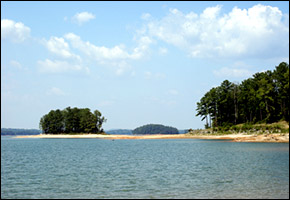Supreme Court Takes Second Look at Michigan’s Asian Carp Injunction
The high court originally rejected a request to order Chicago-area locks closed to keep the invasive fish out of the Great Lakes.

The Supreme Court has agreed to reconsider Michigan’s motion to force the closure of Chicago-area locks and stop the spread of Asian carp into the Great Lakes.
Michigan Attorney General Mike Cox talked about the Supreme Court’s plans during a “town hall” forum at Saginaw Valley State University Monday, the Saginaw News reported. Cox hosted a similar forum in Traverse City in February.
The legal motion, which Cox filed in December, is part of a broader effort by the attorney general to reopen a decades-old lawsuit filed by several states against Chicago and Illinois over the Chicago Waterway System, the century-old network of canals and locks that were built to divert the city’s sewage into the Illinois River instead of Lake Michigan. The ongoing diversion of Great Lakes water, and the canals and locks that are part of it, have allowed a series of invasive species to cross between the Great Lakes and the rivers, including zebra mussels and the round goby.
Cox’s office confirmed Tuesday that the Supreme Court will reconsider his injunction request Friday, and told Circle of Blue that the court is scheduled to consider Cox’s larger request to reopen the Chicago diversion case on April 16.
Asian carp—an invasive fish species that has been making its way up the Mississippi and Illinois rivers for years—threaten to disrupt the Great Lakes ecosystem if they get into the lakes. A series of Chicago-area locks and canals are all that that separate the fish from Lake Michigan and the rest of the Great Lakes at this point. While their DNA has been detected in the water on both sides of the locks, they are not known to have established a self-sustaining population in Lake Michigan.
The bighead carp variety of Asian carp can grow up to 100 pounds and four feet long, eating their weight in plankton daily. The smaller silver carp can grow up to 40 pounds, and are known for jumping out of the water at the sound of boat motors, hitting and injuring boaters. Scientists fear that the carp could disrupt the food chain in the Great Lakes, threatening the game fish population and the region’s $7 billion sportfishing industry.
Source: The Saginaw News










Leave a Reply
Want to join the discussion?Feel free to contribute!